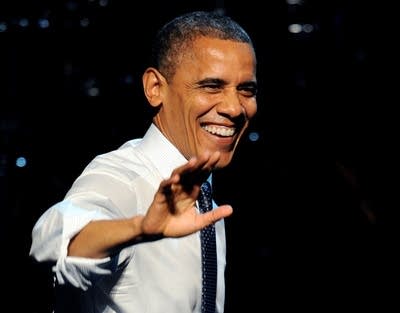What would a second-term Obama presidency look like?
Go Deeper.
Create an account or log in to save stories.
Like this?
Thanks for liking this story! We have added it to a list of your favorite stories.

President Barack Obama released a booklet last week outlining his vision for a second term. Critics say his Blueprint for America's Future still lacks specifics. If Obama is reelected, what can Americans expect in the next four years? What will be his legacy?
George E. Condon Jr. , White House staff writer for National Journal, joined The Daily Circuit Thursday to discuss the potential of a second-term Obama. Don't get your hopes up for sweeping change, he said.
"You are hard-pressed to find a successful second term for a president," he said. "Almost every second-term president has a scandal of some kind. Almost every second term president, the White House is overwhelmed by hubris. They always over-read their mandate."
Peter Kastor, professor of history at Washington University, also joined the discussion.
Turn Up Your Support
MPR News helps you turn down the noise and build shared understanding. Turn up your support for this public resource and keep trusted journalism accessible to all.
So what can we expect from Obama?
The administration will play a wait-and-see game on the economy.
"There are real limitations to how much the government can rapidly change the economy either for better or for worse," Kastor said. "If the economy does better, that is the most important thing that can happen to increase the president's political power to achieve anything else he wants."
More cooperation from Republicans?
Democrats often refer to Senate Republican leader Mitch McConnell's notable quote from 2010: "The single most important thing we want to achieve is for President Obama to be a one-term president."
Condon said the White House is hoping Republicans will be more willing to compromise with Democrats to get things done.
"The president and his staff believe that goal is gone if he's been re-elected," Condon said. "They can't deny him a second term; he already has it. So they're hoping that at that point, Republicans will work with him."
Filling federal court vacancies
When voters think about a president's power to nominate Supreme Court justices, they often forget about the lower-level courts and how they influence the country.
"An area where President Obama would really have to focus on his second term is on the broader federal court system," Kastor said. "There are a large number of vacancies in the federal court system and the Republican filibusters in the Senate have pretty much stymied the president's effort to populate the federal court system. So he might get one or two Supreme Court nominations, but there are a large number of lower federal court vacancies and filling those is exactly the kind of objective that presidents carry into a second term. It's the way they shape their legacy by shaping a larger court system in the U.S."
Comprehensive immigration reform
"The hope at the White House is that Republicans who previously supported comprehensive reform will feel they can go back to their previous position with the election over," Condon said. "There is so much pressure from the grassroots and from the states, with states trying to adopt their own more controversial positions, that pressure will lead to a serious effort on both sides to try to come up with something."
More focus on foreign policy
When a president is unable to work with Congress, "they look to foreign policy where they feel they have a freer hand to do things," Condon said.
Kastor said foreign policy will likely be a major component of the next four years under Obama. "I would not be surprised if we hear a lot about peace in the Middle East," he said. "That's the typical maneuver of all second-term presidents; that's the goal they're going to shoot for."
MPR News' Meggan Ellingboe contributed to this report.




